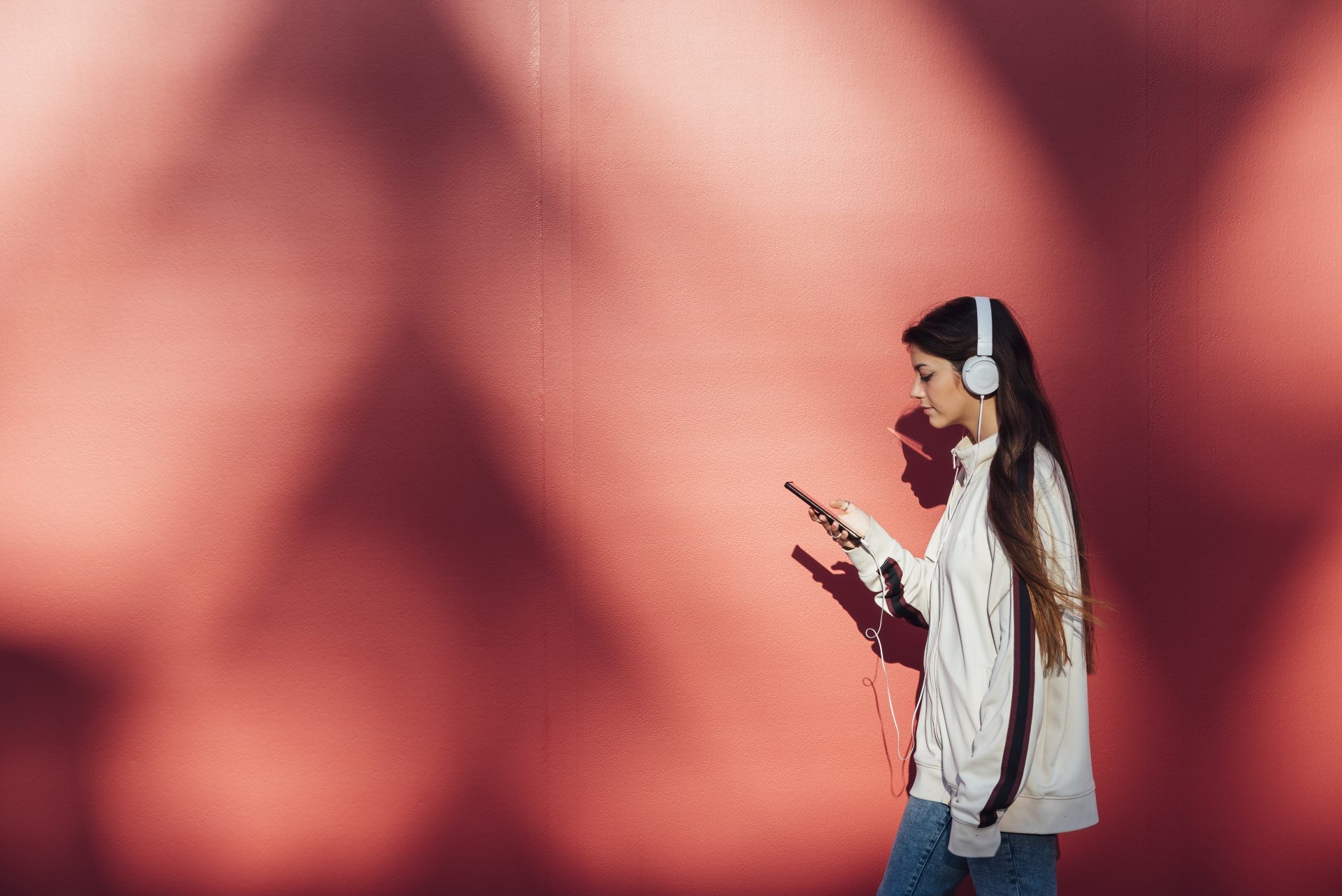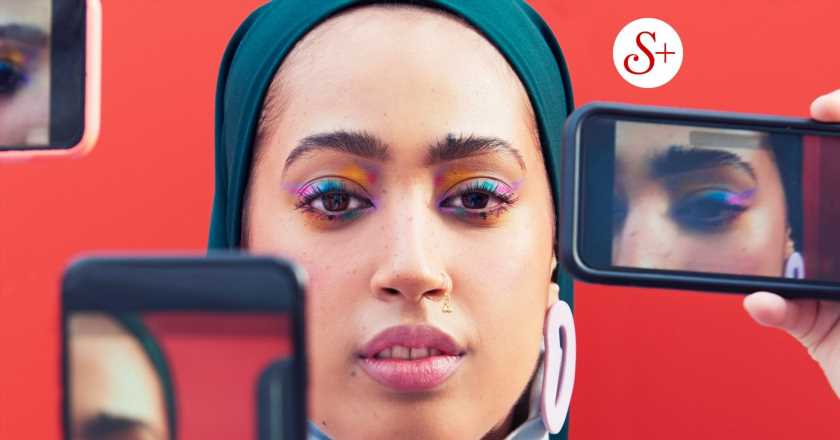Written by Lauren Geall
As Stylist’s digital writer, Lauren Geall writes on topics including mental health, wellbeing and women’s issues. She’s also a big fan of houseplants and likes to dabble in film and TV from time-to-time. You can find her on Twitter at @laurenjanegeall.
Is TikTok making it harder for us to pay attention to long-form content such as books and films? And if so, is there anything we can do about it? Stylist’s Lauren Geall investigates.
I may *technically* be Gen Z, but it took me a while to get into TikTok. At first, I didn’t really understand it. I’ve always loved Instagram, and I wasn’t sure what made TikTok so unique. However, the more the hype built up, the more intrigued I became. Was I really missing out on hundreds of new trends? Did my lack of TikTok-related knowledge make me… irrelevant?
After months of resistance, the FOMO became too much and, eventually, I signed up for an account. Almost straight away, I realised what everyone had been so excited about; with posts on my ‘For You’ feed ranging from hilarious dog videos to stigma-breaking insights into life on a mental health ward, TikTok felt like an open door to the world and its many complexities.
Soon, I found myself spending ages before bed simply scrolling through my feed. Using any kind of technology before bed generally isn’t a good idea, but surprisingly, I didn’t find my TikTok use impacting my sleep. I did, however, feel something else shifting: my attention span.
Where I was once a fan of watching 30-minute YouTube videos and reading 2,000+ word features, I quickly found myself drawn to shorter-form content. Before long, I was even cutting down on the length of time I invested in TikTok videos – if something didn’t grab me within 10 or 15 seconds, I instinctively scrolled past. And even if something did catch my interest, I’d find myself scrolling through the comments as the video played in the background.
This rapid deterioration in my ability to concentrate alarmed me, and eventually, I decided to take a step back from TikTok for a little while. Unsurprisingly, I’m not the only one who has experienced this. Reports in publications including Forbes and The Wall Street Journal have pointed to the fact that TikTok is having a damaging effect on our attention spans – especially among young people. And on social media, multiple users have expressed their concern about developing a ‘TikTok attention span’.
While it’s hard to conclude whether there’s a direct link between TikTok and the lowered attention spans many users are experiencing (other social media apps have also been credited with decreasing people’s attention spans), at the very least, it seems to be exacerbating the issue.
Videos of up to 10 minutes in length have been allowed on the platform since February this year, but despite this, short videos still reign supreme. According to a ‘best practice’ guide published by TikTok back in August last year, one in four top-performing videos on the platform are between 21 and 34 seconds in length, and in June 2021, a slide shown by TikTok to a group of Japanese advertisers that was shared widely on Twitter showed that the company was aware of the decreased attention spans of its users.
Internal TikTok survey data presented to Wired in February 2022 also showed that 50% of surveyed users found videos over a minute long stressful, with a third watching videos online at double speed.
With this in mind, it’s safe to say people’s ability to tolerate longer-form content online is dwindling – especially among dedicated TikTok users. But is TikTok itself actually playing a role in this shift? Is ‘TikTok brain’ a real thing, or is it just symptomatic of the impact social media and the need for instant gratification is having on society as a whole?
The answer is complicated, explains Dr Rachel Taylor, a neuropsychologist and host of the UnBroken podcast. While TikTok may not have the power to permanently change our brains, Dr Taylor says that the app may ‘train’ our brains to prefer shorter, snappier content.
“Our brain itself does not differentiate between what is good or bad for it – it just prefers what is familiar,” she explains. “So, if it’s familiar with short bursts of information, then it will prefer that; if it is used to longer periods of focus, it will prefer that.”

As well as allowing the brain to become familiar with (and therefore prefer) short-form content, the dopamine hit users get from being served content that they like or relate to – something TikTok’s algorithm is particularly good at – functions as a reward that reinforces this behaviour.
“Social media in general is built to be shiny and distracting, and it taps into the parts of our brain that deal with motivation and reward in order to keep users on the platforms,” Dr Taylor says. The amount of energy our attention uses up – as well as the fact that the brain is unable to multitask – could also exacerbate this bias towards short-form content, she adds.
“The brain focuses on what commands the highest appeal and ignores the other demands. Having so much information available in short bursts means that the brain is then just switching between one thing then another and not learning to focus on anything for long periods of time.”
Of course, investing so much energy in switching between such a wide variety of information sources isn’t exactly good for our brain health – but that’s not to say TikTok is all bad.
While it may have played a role in my diminishing attention span, it’s also given me incredible access to people and experiences I wasn’t aware of before. Ever since I decided to try to use the app for shorter periods of time and less frequently, I’ve also started to find it easier to concentrate again – and there are tools you can use to help you do this.
As a spokesperson for TikTok told Stylist: “We care deeply about the safety and wellbeing of our community, and we support users to feel in control of their TikTok experience. This includes surfacing in-feed reminders to take breaks from our app and our Screen Time Management setting, which helps users manage their ideal screen time by choosing a time cap.”
While it’s frustrating that users have to police their own behaviour – many of whom may be unaware of the reasons why they find the app so addictive in the first place – it’s good to see that tools like these exist. However, taking time away from apps like TikTok is only the first step towards retraining your attention span in the long run.
To do this, Dr Taylor explains, you’ll need to have a go at consuming some longer content. “In terms of retraining your brain when it comes to social media use, you have to start small and do it for short bursts of time. So, if you are unable to read for a long stretch of time without looking for distraction, start at 30 seconds and work your way up.”
She continues: “Again, the brain does not differentiate between good or bad, just familiar and unfamiliar. As such, it will attempt to drag you back to the familiar, even it’s not good for you in the long term, because the familiar requires less energy expenditure.”
TikTok may have the potential to mess with our attention spans, but the good news is it isn’t permanent – and there are tools available to help us put boundaries in place. But with more and young people signing up for these apps, should it really be down to users to seek out this information? It’s something worth considering next time you scroll.
Images: Getty
Source: Read Full Article
